|
1.
CENTRAL AND WEST AFRICA
Export market update
The Azobe market in the Netherlands is buoyant,
especially for large sizes used in dragline mats. Prices are
rising due to stronger demand, partly driven by wind
turbine installations across Europe. Demand in the country
for Azobe garden products is declining as autumn
approaches but the Dutch Water Ministry (Waterstaat)
continues to require long lengths for marine piling.
Elsewhere in Europe, however, the market remains quiet.
Chinese Azobe demand has slightly increased, possibly
due to flooding damage and demand in the Philippines
also remains strong as the country needs wood for
reconstruction and housing projects.
Regional markets and operations
Both Cameroon and the Central African Republic are
experiencing heavy rains, affecting timber operations.
The okoume peeling market is stable at low levels.
Plywood production is hindered by frequent electricity
disturbances. In Libreville, power cuts are significantly
disrupting production. Some companies have reduced their
workforce due to machine downtimes. Some Chinese
owned mills have closed due to insufficient orders and
challenges in sourcing alternative species.
In the Republic of Congo operations are running smoothly
without disturbance. The country continues to supply
Okoume and red hardwoods to China and the Philippines.
Gabon
Harvesting and Production
Export contracts with China remain limited, but the local
timber industry in Gabon continues to experience demand
for Okoume wood and there has been a slight increase in
prices.
Significant improvements in infrastructure are underway,
with China funding repairs for 3,000 kilometres of roads,
upgrading them to tarmac surfaces. Container availability
is adequate, ensuring smooth logistics for timber exports.
Market demand and orders
Market demand presents a mixed picture. China
experienced a previous drop in orders, but there is a slight
resurgence in demand, particularly for species like Belli,
Okan, Okoume, and Movingui. The Philippines continues
to show steady demand, especially for reconstruction and
housing projects.
The Middle East market is improving, with increased
enquiries and growing demand for species such as
Andoung, Iroko, Padouk, and Okoume. Enquiry levels in
Europe remain stable, with continued interest in various
timber products.
Regulations, labour and health and safety
Ongoing developments in CITES regulations are having
an impact, but there are no new other government policy
changes affecting the timber industry. Similarly, no
additional changes have been reported regarding
government fees beyond increased port charges and
customs duties.
In terms of health and safety, some cases of COVID-19
have been reported, mainly manifesting as heavy flu due
to the rainy season. Additionally, two cases of Mpox
(Monkeypox) have been announced in Gabon. The
situation is being monitored, but there are no significant
health alerts affecting industry operations at this time.
Cameroon
Harvesting activity affected by heavy rain
Harvesting activities in Cameroon have been affected by
the return of heavy rains, with the rainy season expected to
continue until December, and stock levels are impacted
accordingly. Transportation remains a concern due to
weather conditions. While roads are generally in
acceptable condition, laterite-based roads are managed
with barriers, and no traffic is allowed when it rains. No
major rail disruptions are reported.
Container availability is not an issue in Cameroon, with
enough empty containers in stock to meet export demands.
Port operations are running smoothly, with no significant
disruptions in dispatch or overall activities. NGO
surveillance continues but is limited to monitoring
activities without significant interventions.
In terms of the pandemic, masks are officially required but
are not commonly worn in public. There has been one
officially reported case of Mpox.
Promoting a sustainable and legal trade in rosewood
The Regional Workshop for Range States for African
Rosewood (Pterocarpus erinaceus) was held from
September 2 to 6, 2024, in Douala, Cameroon. Organised
by the CITES Secretariat in cooperation with the
Association Internationale des Bois Tropicaux (ATIBT),
the workshop aimed to promote an integrated approach
among states to ensure sustainable and legal trade.
African Rosewood is one of the most heavily traded
tropical hardwoods globally, used in furniture, musical
instruments, medicines, and fuelwood.
Since 2022, all populations of African Rosewood have
been listed in Appendix II of CITES, requiring that
international trade is conducted in a sustainable, legal and
traceable manner.
See: https://cites.org/eng/news/regional-workshop-for-range-
states-of-african-rosewood-pterocarpus-erinaceus-2024
Republic of Congo
Market Update
In the Republic of Congo, harvesting activities are
impacted by rains in the northern region. Transporting
timber to Douala port in Cameroon is a preferred route for
some operators, as it is closer than Pointe Noire in the
south. Port operations are steady with no disturbances
reported, ensuring smooth dispatch and handling of timber
exports.
Enquiry levels are stable, with the Philippines resuming
purchases of Republic of Congo Okoume sawn timber.
There is slight demand from China, however, and prices
are not meeting expectations, indicating the need for
adjustments between supply and market pricing.
Government regulations are stringent, with businesses
contending with CITES listings for four species,
adherence to the European Union Timber Regulation
(EUTR) and preparing for the upcoming European Union
Deforestation Regulation (EUDR).
Media and trade associations report no further factors that
could affect availability and trade of tropical timber
products.
There is no COVID-19 reported, but caution is urged due
to Ebola cases in some areas and the first cases of Mpox
being reported. The situation is being monitored closely to
prevent impact on industry operations.
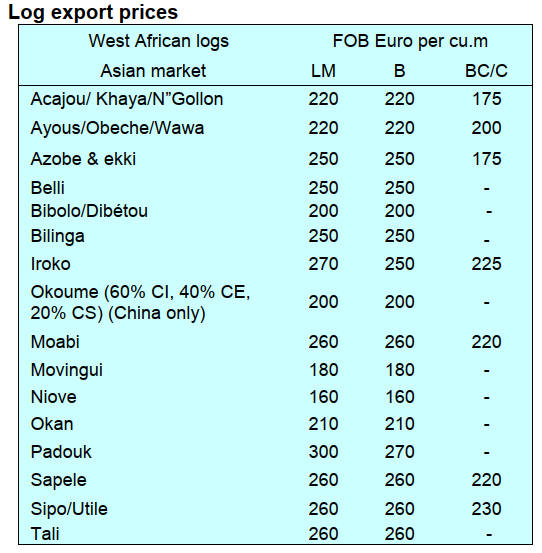
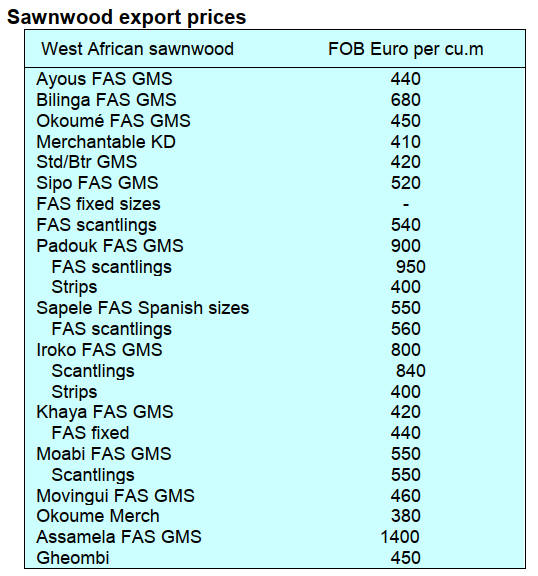
2.
GHANA
TIDD meet stakeholders for wood price review
The Timber Industry Development Division (TIDD) of the
Forestry Commission organised a meeting with
stakeholders to review the export prices of some wood
products with reference to export prices achieved between
July 2022 and August 2024.
The meeting was chaired by the Director of Operations of
TIDD, Dr. Richard Gyimah, and external stakeholders
including Samartex Timber and Plywood Company Ltd.,
the Forestry Industry Association of Ghana (FIAG),
Ghana Timber Millers Organisation (GTMO), Forest
Plantation Timber Exporters and Loggers Association
(FOPTELA), Ghana Timber Association (GTA), and other
members of the timber industry.
The Contract and Permit Manager of TIDD made a
presentation on the proposed price review of selected
species for some specific products. After extensive
discussions, the meeting agreed to increase the cubic meter
price of Niangon boules, Celtis rotary veneer, and Ohaa
rotary veneer. This became possible because since January
2024 the industry has achieved higher prices for these
products than the Guiding Selling Price (GSP), with no
immediate signs of declining.
The per cubic metre price of Denya lumber (No.1C&S
grade) to the Asian market was, however, reduced. It was
anticipated this new price will continue to serve as a boost
to exporting Denya to an already flooded market.
Details of the new prices are expected to be captured in the
TIDD Guiding Selling Price (GSP) for use by relevant
stakeholders.
See: https://fcghana.org/tidd-organises-wood-products-export-
price-review-meeting/
ECOWAS market accounts for largest share of wood
product exports from Ghana
According to data from the Timber Industry Development
Division (TIDD), Ghana’s wood product export to the
African continent during January to July 2024 were valued
at Euro 6.27 million with a total volume of 15,092 cu.m.
These represented 8.79% and 9.58% of Ghana’s total
wood export volume and value respectively for the period
which included lumber (air dried), lumber (kiln dried),
rotary and sliced veneers, and plywood by sea and to the
regional market.
The figures indicated decreases of 27% and 28.5% in
value and volume respectively, compared to Euro 8.60
million and 21,148 cu.m recorded between January and
July last year.
The ECOWAS sub-region market accountedfor the largest
share of the wood products exported from Ghana to
African countries, absorbing 76.7% (11,569 cu.m) in 2024
and 80% (16,913 cu.m) in 2023.
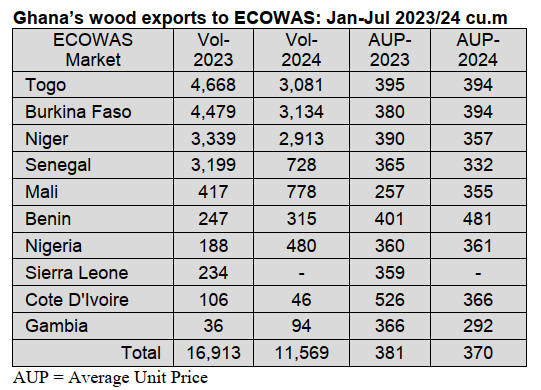
Togo, Burkina Faso, Niger and Senegal were the leading
export markets for Ghana’s wood products during the
period in both 2023 and 2024 within the ECOWAS sub-
region. These countries, however, recorded lower average
unit price (AUP) per cu.m. in 2024 compared to the
previous year. Mali, Benin and Nigeria on the other hand,
recorded significant average unit price increases in 2024
over the same period in 2023 (Graph 1). The overall AUP
decreased 3% from Euro 381 per cu.m in the January to
July period last year to Euro 370 per cu.m in the same
period this year.
Ghana’s economy surges 6.9% in Q2 2024
Ghana’s economy grew by 6.9% in the second quarter of
2024, the fastest rate in five years, boosted by expansion
in several key sectors including agriculture.
This is according to provisional figures released by the
Ghana Statistical Service (GSS). Compared to the first
quarter of 2024, the economy grew by 4.7%.
The Services sector continued to be the largest contributor
to growth in the second quarter of 2024, accounting for
44.2%, followed by the industry sector contributing
32.2%, and the agriculture sector contributing 23.6%.
Ghana's overall industrial sector grew by 9.3%, driven by
mining and quarrying, while the gold sector expanded for
the third consecutive period, by 23.6% in the quarter. The
services sector grew 5.8%, while agriculture rose 5.4%,
the government statistician Samuel Kobina Annim has
said.
The year-on-year inflation rate at ex-factory prices for all
goods and services increased to 33.2% in August 2024,
compared to 29.1% in July 2024.
The Ghana cedi depreciated by 19.6% against the US
dollar on the interbank forex market in July 2024, the
Bank of Ghana has disclosed
See: https://www.myjoyonline.com/ghanas-economy-surges-6-
9-in-q2-2024-fastest-in-five-years/
& https://www.myjoyonline.com/inflation-to-end-2024-between-
15-and-18-deloitte/
AGI recommends nuclear power mix in Ghana
The Association of Ghana Industries (AGI) has expressed
strong support for including nuclear energy in the
country’s energy mix, emphasising its potential to
strengthen energy security and reduce the cost of power –
particularly for businesses and industries. The country’s
industrial sector has long been constrained by high
electricity costs, which limit competitiveness both
domestically and internationally.
The AGI President, Dr. Humphrey Ayim-Darke, noted
that energy reliability is critical to industrial performance
and competitiveness; and nuclear power offers a long-term
solution to current challenges facing the sector.
Energy security, he indicated, is at the heart of industrial
growth and the inclusion of nuclear energy in the power
mix will provide the stability needed. This, he said, will
not only ensure consistent supply but also help reduce the
cost-burden on industries.
The AGI President, therefore called on stakeholders and
power consumers to support the Volta River Authority’s
(VRA) initiatives aimed at enhancing the cost-
effectiveness of current energy solutions while nuclear
plans are still being sought.
See:
https://thebftonline.com/2024/09/25/agi-endorses-nuclear-power-
to-boost-energy-security/
Ghana a key trade partner for Switzerland
Switzerland became Ghana’s number one export partner
with exports from Ghana to Switzerland amounting to
US$3 billion in 2023. The bilateral trade volumes shot up
from US$1.5 billion in 2019 resulting in over US$3 billion
recorded in 2023. Switzerland is not a regular importer of
Ghana’s wood products but in 2020 a Swiss based
organisation – Foundation Franklinia.
In collaboration with the Forestry Commission the
Foundation funded the planting of 100,000 seedlings of
African ‘teak’ in the Asenanyo Forest Reserve.
See: https://citinewsroom.com/2024/08/switzerland-becomes-
ghanas-top-export-partner-with-3bn-in-trade-in-2023/
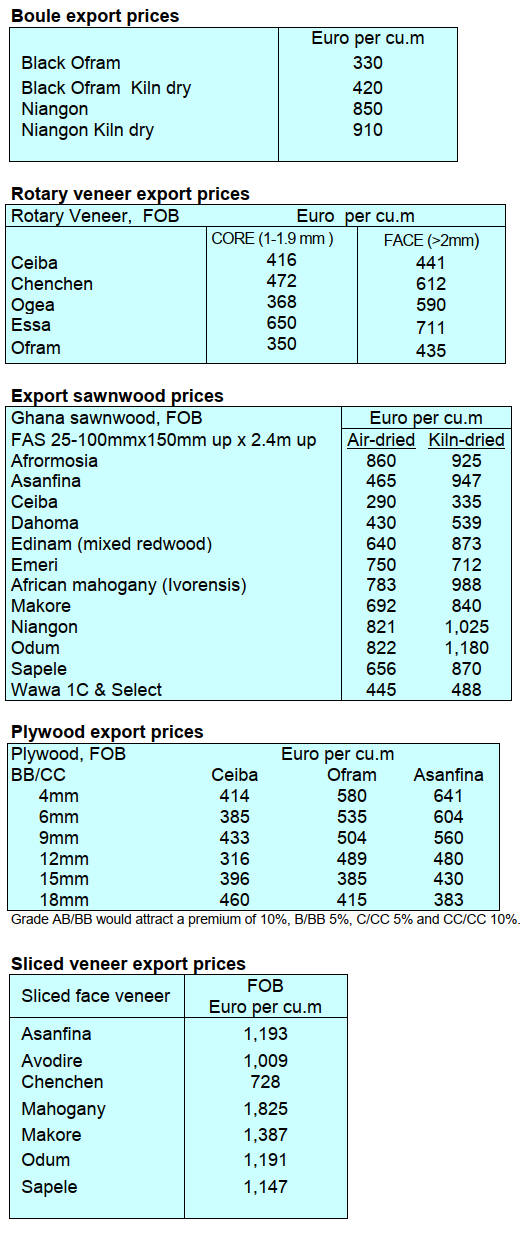
3. MALAYSIA
Expanded free trade agreement
Malaysia has officially ratified the UK’s accession to the
Comprehensive and Progressive Agreement for Trans-
Pacific Partnership (CPTPP), a significant milestone as it
is effectively Malaysia’s first bilateral free trade
agreement with the UK. Malaysia joins Japan, Singapore,
Chile, New Zealand, Vietnam, and Peru in the ratification
process.
The UK’s entry into the CPTPP will increase the
combined gross domestic product value of the bloc to
US$15.4 trillion, or 15% of global GDP.
The ratification allows Malaysian exports to benefit from
immediate duty-free treatment on 94% of tariff lines,
particularly for palm oil, cocoa, rubber, electric and
electronics, chemicals, as well as machinery and
equipment. The agreement is expected to enter into force
by end-2024 for the UK and the countries that have
ratified it.
The CPTPP members are Australia, Brunei, Canada,
Chile, Japan, Malaysia, Mexico, New Zealand, Peru,
Singapore and Vietnam.
See:
https://www.freemalaysiatoday.com/category/nation/2024/09/20/
malaysia-now-officially-part-of-cptpp/
PEFC EUDR due diligence system
The Malaysian Timber Certification Council Board of
Trustees has approved adoption of the newly developed
PEFC EUDR Due Diligence System (DDS) standard,
PEFC ST 2002-1:2024 Requirements for the
Implementation of PEFC EUDR Due Diligence System
(PEFC EUDR DDS).
This standard is an extension of the existing PEFC Chain
of Custody standard PEFC ST 2002:2020 – Chain of
Custody of Forest and Tree-Based Products –
Requirements.
This modular and optional standard is designed to support
PEFC Chain of Custody (CoC) companies that currently
export to the EU market, plan to do so, or whose products
may ultimately be sold in the EU, to comply with the
requirements of the EUDR by providing a comprehensive
framework for conducting due diligence. The key
difference between the existing PEFC ST 2002:2020
standard and the PEFC ST 2002-1:2024 is the integration
of EUDR requirements into the due diligence process.
Currently there are 6.6 million hectares of MTCS – PEFC
Certified Forests in Malaysia, in 35 Certified Natural
Forest (FMUs) and nine Certified Forest Plantations
(FPMUs). MTCS – PEFC Certified Chain of Custody
certificates are held by 368 companies.
See: https://mtcc.com.my/adoption-of-pefc-technical-document-
pefc-st-2002-12024-requirements-for-the-implementation-of-
pefc-eudr-due-diligence-system-pefc-eudr-dds/
Sarawak calls for peatland restoration action
Sarawak has called for binding targets for peatland
restoration and urged international bodies to act urgently
on the issue.
Speaking at the 15th International Sago Symposium
opening hosted by the Sarawak Tropical Peat Research
Institute (Tropi), Premier Abang Johari Tun Openg said
voluntary efforts alone do not suffice.
“We need binding targets for peatland restoration,
attractive incentives for sustainable agricultural practices,
and a collective effort from the public and private sectors,”
he said.
See:
http://theborneopost.pressreader.com/article/281621015741697
Sarawak furniture makers urged to push exports
Sarawak’s furniture producers have been urged to emulate
the example of counterparts in other Malaysian states and
drive-up exports by the head of their industry organisation.
The president of the Sarawak Furniture Manufacturers
Association Kapitan Kong Kim Hong said that
opportunities in the international furniture market were
continuing to grow, and Malaysia as a whole was already
capitalising.
According to Deputy Prime Minister Datuk Seri Fadillah
Yusof, speaking at the Malaysia International Furniture
Expo last year, the global furniture market value is
expected to reach US$550 billion by 2027,” at a July
SFMA Miri branch meeting. “Since the Covid pandemic,
Malaysia’s furniture exports have remained above RM100
billion and in 2022 reached RM115 billion. This makes it
the second-largest furniture exporter in the world.”
Sarawak, he added, had not benefited as much as other
parts of the country from market growth. To grow export
sales, he recommended that Sarawak furniture makers
should diversify their ranges and target international
markets with quality products.
See:https://mtc.com.my/images/media/1742/2._Sarawak_Furnitu
re_Manifacturers_Urged_To_Boost_Exports_theborneopost.pdf
Land shortage curbs bamboo sector growth
Availability of land was highlighted as the main factor
holding back the expansion of the Malaysian bamboo
industry, according to Plantations and Commodities
Minister Datuk Seri Johari Abdul Ghani.
Speaking in parliament, the Datuk Ghani said that state
governments were limiting access of land to bamboo
plantation operators, who need at least 2,000 ha to
‘implement the concept of commercial bamboo
cultivation’.
He went to say that “in comparison, palm oil has 5.7
million ha, and rubber 1.1 million ha, while bamboo has
only 4,000 ha”. “This disparity hinders both upstream and
downstream industrial development.”
The Minister said state governments were not prepared to
allocate land for bamboo. Despite incentives, they
favoured providing land for palm oil due to its
“established ecosystem, comprehensive value chain and
export value”.
See:
https://mtc.com.my/images/media/1740/3._Land_shortage_hinde
rs_bamboo_industry_growth_says_Johari_nst.com.my.pdf
4.
INDONESIA
Weakening plywood demand leads to layoffs
Thousands of employees in upstream and downstream
forestry industries have been laid off due to sluggish
international demand for plywood products and the
Association of Indonesian Forest Concession Holders
(APHI) says policy incentives are needed to prevent the
current situation from continuing.
According to APHI data, in the first half of 2024 2,400
employees working in Forest Utilization Business
Permit—Natural Forests (PBPH-HA) companies were laid
off, and 125 others sent home. Layoffs also occurred in the
plywood processing industry. It was reported that 6,250
people working in three plywood industry groups were
laid off.
APHI Deputy Chairman for Natural Forests Dr David
explained that the market continues to be slow in the
aftermath of the COVID-19 pandemic and due to
geopolitical conflicts. "Weakening demand for plywood in
the global market impacted the processing industry and
PBPH upstream, the suppliers of raw materials," he said
on September 17.
He added that, due to slow plywood export trade, there is a
913,000 cu.m stock of natural forest logs from 35 PBPHs
that the industry has not absorbed. "Many PBPHs are
having difficulty operating because no industry is buying
the wood they produce while costs are getting higher due
to various factors such as fuel prices," he said.
Currently, only 94 out of 247 PBPH-HA units are in
production. PBPH-HA roundwood production is also
described as deficient. As of August 2024, it was recorded
at only 2.21 million cu.m, or 39% of the annual production
projection of 5.58 million cu.m.
Dr David proposed several policy incentives to revive the
forestry industry and avoid employee layoffs. One of them
is expanding the range of processed wood products that
can be exported.
He also proposed that to spur the processing industry and
increase the absorption of wood production, the
government should open the door to exporting sawn
timber products to exploit marketing opportunities abroad.
"Sawn timber exports will increase demand for wood
from
PBPH, while still providing added value to the processed
wood industry," he said.
See: https://agroindonesia.co.id/ribuan-karyawan-industri-
kehutanan-terkena-phk-perlu-insentif-kebijakan-dan-perluasan-
pasar-domestik/
Furniture exports January to July hit US$1.2 billion
The Ministry of Industry (Kemenperin) reports exports of
domestically made furniture products at US$1.2 billion
from January-July 2024, after achieving export earnings of
US$2.11 billion in 2023. Referring to the figures, Director
General of Small, Medium and Multifarious Industries
(IKMA) Reni Yanita said the potential of domestic
furniture products is considerable.
She attributed the strong interest of global markets in
Indonesian furniture to the fact that small and medium
industry players (IKM) continued to innovate and were
able to adjust to market trends and consumer needs. She
said IKMA supports development of local furniture IKM
players so they can be more globally competitive,
including through implementation of production technical
guidance, machine and equipment restructuring and
development of IKM centres.
See: https://voi.id/en/economy/417286
Exhibition could generate US$2.27 million for
Indonesian furniture makers
The Ministry of Trade reported that Indonesian furniture
producers could generate US$2.27 million (Rp35.01
billion) from the 2024 Korea International Furniture and
Interior Fair (Kofurn), held from August 29 to September
1, 2024.
Indonesia participation was supported by the Ministry of
Trade via the Indonesian Trade Promotion Center (ITPC)
in Busan, in collaboration with the Seoul Trade Attaché,
the Embassy of the Republic of Indonesia (KBRI) in
Seoul, and the Indonesian Furniture and Craft Industry
Association (Asmindo).
Husodo Kuncoro Yakti, Head of ITPC Busan, said the
success of the event resulted from exhibitors’ business
matching with visitors and the level of interest in the
Indonesian Pavilion at the event.
See: https://www.antaranews.com/berita/4334491/potensi-
transaksi-furnitur-indonesia-di-korsel-rp35-miliar
IFFINA attracts strong international interest
The IFFINA Indonesia Furniture & Design Expo, run by
the Indonesian Furniture and Craft Industry Association
(Asmindo), was attended by 200 foreign furniture
companies.
According to Asmindo General Chairman, Dedy
Rochimat, a key theme of the 14-17 September event was
'Sustainable by Design', with Indonesian furniture makers
focused on environmental impact.
The goal of the show was to raise the profile of the
Indonesian furniture and craft industry and awareness of
its capabilities more broadly. Dedy said that the exhibition
featured latest trends and advances in furniture production
and interior design and that the goal was a 30% increase in
transactions generated by the event over the US$200
million achieved at the 2023 edition of the show.
See: https://katadata.co.id/berita/industri/66e692d8dad57/bidik-
pasar-mebel-dunia-rp-107-triliun-asmindo-gelar-pameran-
internasional
MSMEs have potential to make Indonesia a home
decor hub
Speaking at the IFFINA exhibition, Cooperatives and
Small and Medium Enterprises (SMEs) Minister, Teten
Masduki, said Indonesia can become a global hub for
home decor given the vast potential of its local products.
“Based on data, furniture and craft products annual exports
are up to US$3.5 billion,” he said. “The industry
comprises 1,114 companies and employs around 143,000
workers.”
According to Masduki, Indonesia’s vision of becoming a
global hub involves a major push to facilitate international
market access. Consequently, the Ministry of Cooperatives
and SMEs is backing efforts to build capacity of micro,
small, and medium enterprises (MSME) in the furniture
sector. “We have established joint production houses to
push aggregation, while maintaining production quality in
accordance with world standards,” the minister said.
He said his ministry is also organising more trade forums
abroad to expand export opportunities for MSMEs. One
such forum, held at the Indonesian Embassy in
Washington generated potential business worth Rp7
billion (US$461,700).
The US event featured 13 MSMEs from the furniture
industry, and also representatives of other sectors
including fashion, food and beverages, plus startups. It
was attended by 120 in-person and 50 online participants,
including potential buyers and US business associations.
“This success demonstrates the significant market
potential for Indonesian MSMEs in the US,” Masduki
said. “It also proves that our products are world-class
quality and can compete in the global market.”
See: https://en.antaranews.com/news/326019/indonesia-will-be-
home-decor-hub-smes-minister
Success of SVLK verification highlighted to UK
Minister
The Indonesian Minister of Environment and Forestry, Siti
Nurbaya, received Anneliese Dodds, UK Minister for
Development in Jakarta on 17 September.
The bilateral meeting addressed sustainable forest
management, climate and environmental agendas and
opportunities for cooperation leading up to the Conference
of the Parties (COP16) on Biodiversity (CBD) and COP29
on Climate Change (UNFCCC).
During the meeting, Minister Siti highlighted the success
of Indonesia’s SVLK `Legality and Sustainability
Verification System’, which was developed in
collaboration with the British government. She said other
countries frequently invite Indonesia to share its
experiences in sustainable forest management.
The Minister also explained the paradigm shift in
Indonesia's forest management from previously focusing
on wood to a more holistic landscape management
approach, prioritising a balance between economic, social,
and ecological aspects.
See: https://forestinsights.id/terima-kunjungan-menteri-
pembangunan-inggris-menteri-lhk-singgung-keberhasilan-kerja-
sama-pengembangan-svlk/
Using certified products helps maintain forests and cut
emissions
The use of certified forest products will preserve forests
and their biodiversity and contribute to carbon emissions
reduction and circular economy development. This was
the conclusion of the ‘Forest Product Standards in a
Circular Economy for Green Construction’ National
Symposium held in Jakarta on September 12.
The event was hosted by the Standardization and
Instrumentation Agency of the Ministry of Environment
(KHLK) and addressed forest product standards' vital role
in supporting sustainable development, particularly in the
construction sector.
Head of the KLHK’s Standardization and Instrumentation
Agency, Ary Sudijanto, emphasised the urgency of using
certified and sustainably managed forest products.
Sustainably produced wood, he said, can preserve
biodiversity, reduce carbon emissions, and support a
circular economy.
The symposium also discussed the importance of
integrating forest product standards for green construction
to address the challenges of climate change and the
biodiversity crisis. One of the key points discussed in the
symposium was the role of the circular economy in forest
management.
See: https://rm.id/baca-berita/government-
action/235396/simposium-nasional-dorong-standar-produk-hasil-
hutan-untuk-konstruksi-hijau
Forest management no longer focused solely on wood
Deputy Minister of Environment and Forestry Alue
Dohong highlighted that the current forest management
paradigm has shifted and is no longer solely focused on
wood. Moreover, several urgent issues must be addressed
to ensure sustainable forest management.
The Deputy Minister made the comments as he opened the
16th International Symposium of the Indonesian Wood
Research Society (IWORS) at Tanjungpura University in
Pontianak, West Kalimantan.
He said Indonesia has established five essential pillars to
ensure sustainable forest management and the welfare of
its people. They comprise [forest] area certainty, business
guarantees, productivity, product diversification, and
competitiveness. These, said the Deputy Minister, serve as
the guiding principles from planning to forest utilization.
“Integrating forest policy and management is crucial, not
only for environmental conservation but also for economic
prosperity and social welfare,” he emphasized.
Growing challenges, such as deforestation and climate
change, require comprehensive strategies that align policy
frameworks with practical management approaches, he
concluded
See: https://forestinsights.id/wamen-lhk-tegaskan-pengelolaan-
hutan-tak-lagi-berpusat-pada-kayu-beberkan-masalah-mendesak/
Indonesian minister stresses importance of carbon
trading system
Minister of Environment and Forestry, Siti Nurbaya, has
emphasised the importance of carbon trading in reducing
greenhouse gas emissions.
"There is a misunderstanding,” she said during a focus
group discussion with Commission IV of the House of
Representatives in Jakarta. “People might think carbon
trading means selling all the carbon from our forests, but it
is actually about reducing emissions by planting more to
increase carbon absorption."
Nurbaya stated that carbon pricing aims to meet the
climate targets outlined in the Nationally Determined
Contribution (NDC) document, which reflects Indonesia's
commitment to the global community in reducing
emissions.
Carbon services, she added, must come from high-
integrity environments and activities carried out with
integrity. To ensure it’s not greenwashing, not just any
carbon can be traded. "Carbon trading requires
transparency, accountability, comparability, and
consistency," said Nurbaya.
See: https://en.antaranews.com/news/326791/indonesian-
minister-stresses-importance-of-carbon-trading-system
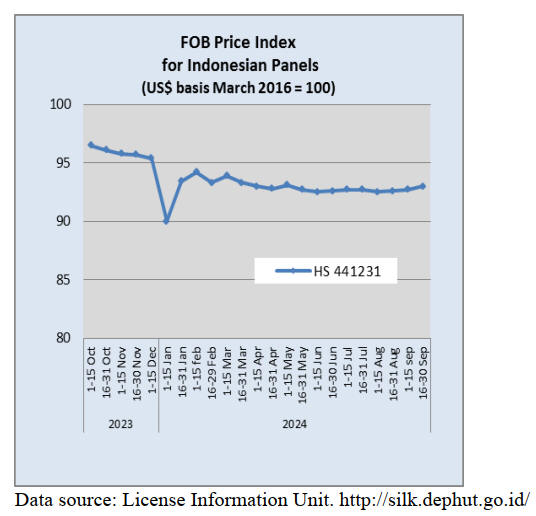
5.
MYANMAR
Continued currency sales by Central Bank
In late September 2024, the Central Bank of Myanmar
(CBM) sold significant amounts of US dollars, Chinese
Yuan, and Thai Baht. On September 25, it sold nearly
US$13 million at a rate of 3,524 kyat per US dollar along
with 700,000 Yuan. Earlier, on September 23, the CBM
sold US$23 million, and on September 20, it sold US$1.28
million and 800,000 Yuan.
Mid-September the CBM conducted various sales,
including US$30 million to fuel oil companies. It also sold
US$8.5 million and over 2 million Thai Baht on
September 19, followed by another 3 million Baht the next
day. In the preceding days, smaller sales included
US$300,000 on September 17, US$5 million on
September 16, and US$230,000 on September 13. The
CBM has been using the foreign exchange market to
stabilize the currency and manage liquidity amid ongoing
economic challenges.
See: https://elevenmyanmar.com/news/cbm-sells-nearly-13-
million-at-3524-kyats-per-dollar-and-700000-yuan-on-
september-25
Investment urged by Myanmar’s China Ambassador
At the 21st China-ASEAN Expo in Nanning, Myanmar's
ambassador to China, Tin Maung Swe, urged China and
ASEAN countries to invest in Myanmar's agriculture,
livestock, and various other sectors.
He highlighted the importance of uninterrupted global
supply chains and increased market opportunities for
Myanmar, inviting cooperation in areas such as transport,
IT, energy, infrastructure, and manufacturing. Despite
Myanmar's challenges following political developments in
February 2021, ASEAN and China remain its largest trade
partners.
However, foreign investment in Myanmar has
significantly declined with many investors either leaving
or suspending operations.
See: https://eng.mizzima.com/2024/09/27/14431
Flood death toll reaches nearly 270
The death toll from ongoing flooding in Myanmar has
risen to nearly 270, and 88 others are still missing,
Myanmar’s authorities report. The United Nations has
warned that 630,000 people in Myanmar may need
assistance following Typhoon Yagi. In response to this
emergency, the government has called for international
aid.
See:.unocha.org/publications/report/myanmar/myanmar-flood-
situation-report-3-27-september-2024
Passport rule changes for students in Thailand
Myanmar nationals studying in Thailand on short-term
education visas will no longer be able to renew their
passports at the embassy in Bangkok or the consulate in
Chiang Mai and must return to Myanmar for renewals.
This restriction comes as the military junta seeks to
address troop shortages following losses to rebel groups.
Many draft-eligible individuals have fled or joined
opposition groups. Around 3,700 Myanmar nationals are
studying in Thailand. However, those in undergraduate
and postgraduate programs can still apply for a special
"Passport for Education" to remain legally in Thailand.
See: https://www.rfa.org/english/news/myanmar/myanmar-
thailand-students-passports-09202024201855.html
6.
INDIA
Standards Bureau builds
awareness of mandatory
plywood QCO
The BIS (Bureau of Indian Standards) and DPIIT
(Department for promotion of industry and internal trade)
have stepped up efforts to inform industry via testing
laboratories and awareness workshops about
implementation of the Quality Control Order (QCO) for
Plywood and Flush Doors in February 2025.
Up to August 2024, 900 plywood manufacturing units had
managed to obtain the mandatory certification required for
conformance out of an estimated total of 3,000. Concerns
have been raised that the remaining 2,100 units will find it
difficult to undertake the required testing and secure
certification in time, with certificates taking three months
for BIS to issue.
To solve the problems faced by micro, small, medium
sized enterprises (MSMEs) in relation to the cost of
logistics associated with testing, the government is
working with the established laboratories of companies
like Tata Steel and facilities recognised by the National
Accreditation Board for Testing and Calibration
Laboratories, which can be used for testing plywood and
panel products.
The QCO does not affect goods manufactured
domestically in India for export but does apply to imported
products.
The BIS has stated that stakeholders with concerns about
the QCO can address them direct to its centres or mail
them to the DPIIT.
See: https://www.bis.gov.in/wp-
content/uploads/2023/09/Notified-Plywood-and-Wooden-flush-
door-shutters-Quality-Control-Order-2023-in-e-Gazette.pdf
and https://induceindia.com/bis-certification-for-plywood-and-
wooden-flush-door-shutters/
World Bank says Indian economy continues to grow
The Indian economy continues to grow at a healthy pace
despite challenging global conditions, according to the
World Bank’s latest India Development Update: India’s
Trade Opportunities in a Changing Global Context
(IDU). However, it says to reach its goal of US$1trillion
merchandise exports by 2030, India needs to diversify its
export basket and leverage global value chains.
The IDU reports that India remained the fastest-growing
major economy and grew at 8.2% in the 2023-24 financial
year. Growth was boosted by public infrastructure
investment and an upswing in household real estate
spending.
On the supply side, it was supported by a buoyant
manufacturing sector, which grew by 9.9%, and resilient
services activity, which compensated for
underperformance in agriculture. Reflecting these trends,
urban unemployment has improved gradually since the
pandemic, especially for female workers.
Female urban unemployment fell to 8.5% in early 2024,
although urban youth unemployment remained at 17%.
Despite challenging external conditions, the World Bank
expects India’s medium-term outlook to remain
positive. Growth is forecast to reach 7% in FY24/25 and
remain strong in FY25/26 and FY26/27.
The IDU also highlights the critical role of trade for
boosting growth. The global trade landscape has witnessed
increased protectionism in recent years.
The post pandemic reconfiguration of global value chains,
triggered by the pandemic, has created opportunities for
India. The report emphasizes that India has boosted its
competitiveness through the National Logistics Policy and
digital initiatives that are reducing trade costs. However, it
also notes that tariff and non-tariff barriers have increased
and could limit potential for trade focused investments.
See: World Bank
https://documents.worldbank.org/en/publication/documents-
reports/documentdetail/099513209032434771/idu113d06cd810fe
c1465e1a7e318a711ea131b8
Russia’s timber giant target India
At present just 3% of Russian timber is traded into India
but, according to a report by Wood Central, that may
change as the Segezha Group, Russia’s largest timber
exporter responsible for more than 30% of its trade, is
targeting the country’s expanding market.
See: https://woodcentral.com.au/russias-timber-giants-target-
india-as-ukraine-sanctions-bite/
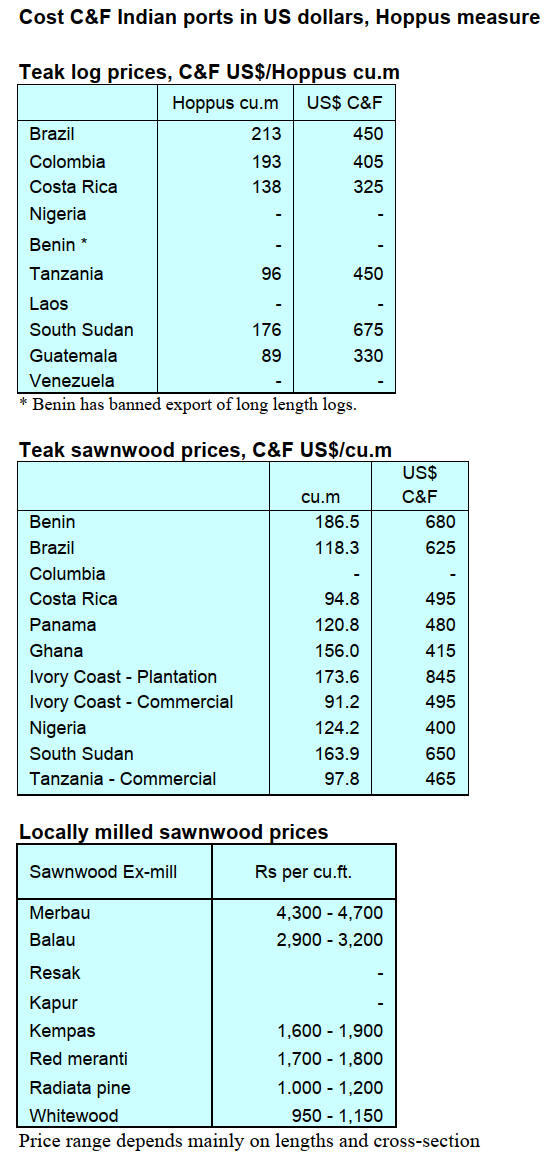 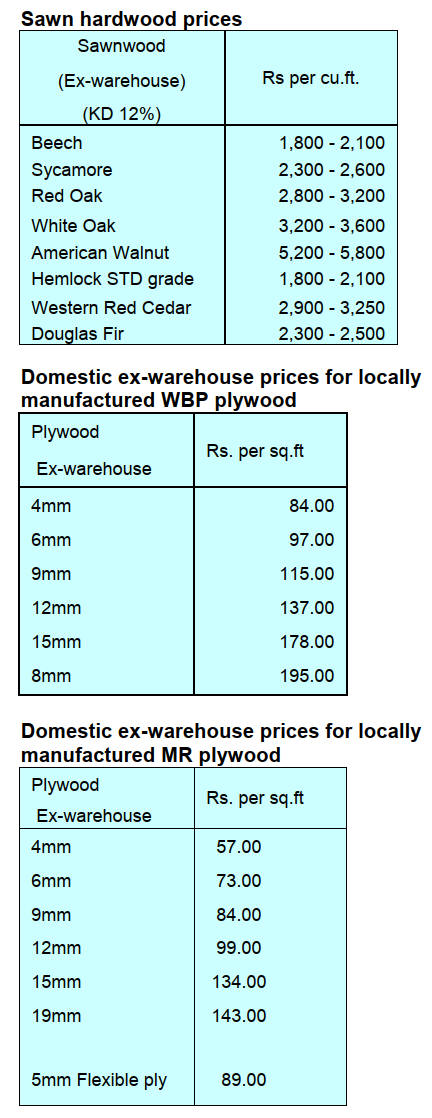
7.
VIETNAM
Wood and wood products (W&WP) trade
highlights
According to statistics from the General
Department of Customs, in August 2024, Vietnam’s
W&WP export turnover reached US$1.5 billion, up
9.2% compared to July 2024 and up 16.7% compared
to August 2023. Of this, the WP export turnover,
alone, was US$1.03 billion, up 5.1% compared to July
2024 and up 22% compared to August 2023.
In the first 8 months of 2024 W&WP exports reached
at US$10.4 billion, up around 23% over the same
period in 2023. WP export turnover, in particular,
contributed US$7.1 billion, up 24% over the same
period in 2023.
The W&WP exports to the Dutch market in
August 2024 amounted to US$2.7 million, down 64%
compared to August 2023. Generally, in the first 8
months of 2024, the W&WP export turnover to this
market brought about US$47.7 million, up 12% over
the same period in 2023.
Vietnam's office furniture exports in August
2024 were valued at US$16.2 million, down 38%
compared to August 2023. Generally, in the first 8
months of 2024, the exports of office furniture
contributed US$173 million, up 0.2% over the same
period in 2023.
Vietnam's W&WP imports in August 2024
accounted for US$270.7 million, up 3.1% compared to
July 2024 and up 46.1% compared to August 2023.
Generally, in the first 8 months of 2024, W&WP
imports reached US$1.79 billion USD, up 26.6% over
the same period in 2023.
Vietnam's poplar import volume in August
2024 was 42.6 thousand cu.m, worth US$17.0 million,
up 3.1% in volume and 3.2% in value compared to
July 2024; an increase of 44.1% in volume and 48.7%
in value compared to August 2023. Generally, in the
first 8 months of 2024, poplar imports accumulated at
259.7 thousand cu.m, worth US$100.1 million, up
26.6% in volume and 15.9% in value over the same
period in 2023.
Import volume of raw wood (log, lumber
and wood-based panels) from China in August 2024
was 85 thousand cu.m, with a value of US$34 million,
up 1.2% in volume and 6.1% in value compared to
July 2024; bringing the total volume of raw wood
imported from China in the first 8 months of 2024 to
591.82 thousand cu.m, with a value of US$234.54
million, up 76.2% in volume and 46.8% in value over
the same period in 2023.
W&WP exports/imports in the first 8 months of 2024
According to the statistics from the General Department of
Customs, Vietnam's W&WP export turnover in August
2024 reached US$1.5 billion, up 9.16% over the previous
month, and up 16.65% over the same period in 2023. Of
which, WP exports fetched US$1.03 billion, up 5.11%
compared to July 2024 and up 21.97% over the same
period last year.
Over the first 8 months of 2024, the W&WP exports
totaled US$10.41 billion, up 22.6% year-on-year, ranking
6th in value amongst Vietnam's export commodity groups.
Of this, the WP export turnover was US$7.12 billion, up
24.02% over the same period last year, accounting for
68% of the total W&WP export turnover (this proportion
last year was 67.61%).
Foreign direct investment (FDI)
In August 2024, the W&WP export turnover contributed
by FDI enterprises reached over US$690 million, up
3.75% over the previous month, and up 17.97% over the
same period last year. In which, WP export turnover
reached US$638 million, up 3.55% compared to July
2024, and up 22.33% over the same period in 2023.
In the first 8 months of 2024, W&WP export turnover
shared by FDI enterprises amounted to US$4.8 billion, up
25% over the same period last year and accounting for
46% of Vietnam’s total W&WP export turnover. In which
W&WP export turnover reached US$4.38 billion, up
25.16% over the same period in 2023, accounting for 91%
of the total export turnover attained by FDI enterprises and
accounting for 61.6% of the total export turnover of
Vietnam’s WP exports. In 2023, this proportion for the
same period was 61.03%.
Export markets
In August 2024, W&WP export turnover to the US market
reached US$858 million, a slight increase compared to the
previous month (5.5%), but up 279% over the same period
last year, accounting for 57% of the country's W&WP
export turnover. The US remains the top export market,
making an important contribution to the industry-wide
growth in August 2024.
In August, W&WP export turnover to South Korea valued
at US$69 million, up 116% over the previous month and
up 11% over the same period in 2023. W&WP exports to
China grew strongly compared to July (up 26%) but
decreased slightly over the same period (down 7%). In
contrast, compared to the previous month, W&WP export
turnover dropped sharply to France (20%), the
Netherlands (30%), Thailand (10%).
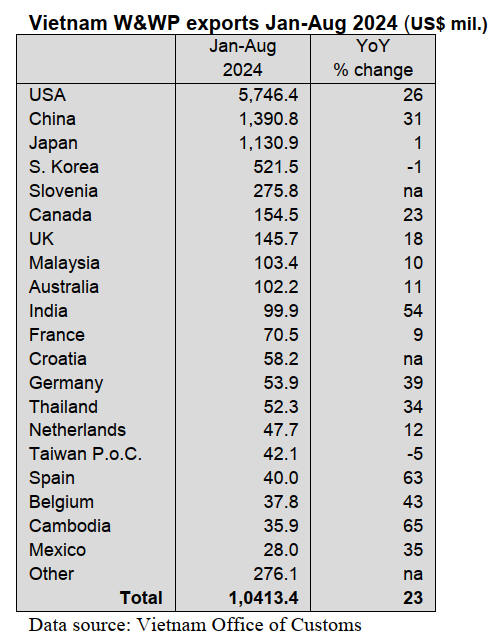
In the first 8 months of 2024, W&WP exports to top
markets increased significantly. The US remains the
largest export market, reaching over US$5.74 billion, up
26% over the same period last year and accounting for
55%t of the country's total W&WP exports.
The W&WP exports to the Chinese market increased by
31%, Canada 23%, the UK 18%, Germany 39%. while
other markets have recorded quite high growth over the
same period last year.
Japan is Vietnam's 3rd largest W&WP export market, but
export turnover in the first 8 months of 2024 to Japan
recorded a low increase, only up 1.5% over the same
period. Eight months saw a slight decline in W&WP
export turnover to the South Korean market, down 0.5%.
Imports of W&WP
According to statistics from the General Department of
Customs, W&WP import turnover to Vietnam in August
2024 recorded at US$270 million, up 3% compared to July
2024 and up 46% compared to August 2023.
In the first 8 months of 2024, W&WP import turnover to
Vietnam reached US$1.79 billion, up 27% over the same
period last year.
Foreign Direct Investment (FDI) Enterprises
In August 2024, the import turnover of W&WP
contributed by FDI enterprises reached nearly US$95
million, down 1.51% compared to the previous month and
up 53.2% over the same period in 2023.
In the first 8 months of 2024, the W&WP imported by FDI
enterprises reached US$675 million, up 37.8% over the
same period in 2023, accounting for 37.71% of the total
Vietnam’s W&WP imports. This rate of the same period
last year was 27.36%.
Imports
In August 2024, W&WP imports from Thailand, Chile,
Brazil, Italy and Indonesia increased significantly
compared to July 2024, of which, imports from Chile
soared by 90% and Brazil by 69%. In contrast, compared
to July 2024, imports from the US, France, Germany, and
Belgium decreased by 167%, 124%, 21%, 36%,
respectively, and imports from Cambodia decreased by
22%.
In the first 8 months of 2024, W&WP imports from China,
the US, Thailand, Chile, New Zealand and Italy surged.
Leading the list of import sources was China with a share
of US$704 million, up 51% over the same period,
accounting for 39% of the country's imports. Next to
China was the US with a turnover of US$208 million, up
30%, accounting for 12% of the total imports. In contrast,
imports decreased slightly in some key markets such as
France, Laos, Indonesia and Malaysia.
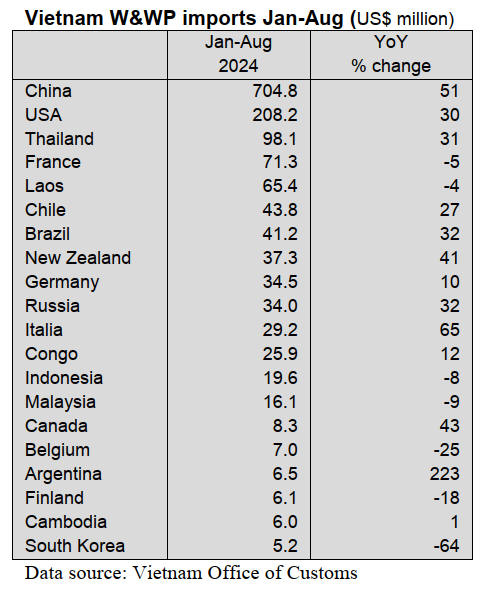
8. BRAIL
Boosting private investment in forest
sector
The National Bank for Economic and Social Development
(BNDES) has launched the BNDES Forests Credit
programme with a R$1 billion fund to boost private
investments in the forest sector for companies of all size
using native timber species.
To access the BNDES Forests Credit, companies need to
operate in one of the following: sustainable forest
management; restoration of vegetation cover; forest
concessions; planting of native species and agroforestry
systems; support for the production chain of timber and
non-timber products from native species; acquisition of
machinery and services associated with these activities.
The programme combines resources from the Climate
Fund (R$456 million) and R$544 million from BNDES
traditional credit lines, such as BNDES Finem
Environment, offering financing at low rates and flexible
terms. Project value can be up to R$100 million. Financing
will be structured according to BNDES’ standard
regulations, considering the specifics of each project.
BNDES also aims to attract the private sector,
collaborating with commercial banks and companies with
the aim of transforming Brazil into one of the global
leaders in forest restoration.
During the United Nations Framework Convention on
Climate Change (UNFCCC) COP 28, at the end of last
year, the Brazilian government launched an initiative to
transform the “Arc of Deforestation” into the “Arc of
Restoration,” by restoring 24 million hectares of natural
forest by 2050, potentially removing around 1.65 billion
tonnes of carbon dioxide from the atmosphere over 30
years.
In addition to capturing carbon, the project aims are to
promote biodiversity, generate jobs and income, and
stimulate the sustainable production of food, such as açaí
and cocoa.
See: https://www.remade.com.br/noticias/20218/bndes-lanca-
programa-para-impulsionar-investimentos-em-florestas-nativas-
no-pais
Furniture industry contributes to recovery in Rio
Grande do Sul
After the extensive flooding in the state of Rio Grande do
Sul in the south of Brazil from April into May 2024, the
furniture sector has played a crucial role in its economic
recovery.
Despite logistical challenges and losses, more than 2,400
furniture manufacturers recorded sales of R$ 6.14 billion
in the first half of the year, an increase of 9% compared to
the previous year. Exports also rose by 6.8%, reaching
US$ 119.7 million, with particularly strong growth to the
United States, Chile, and Uruguay.
In addition to the furniture sector showed solidarity with
local communities, with campaigns such as “Sponsor a
city” (Apadrinhe uma Cidade) and “United for Bento
Gonçalves” (Unidos por Bento)”, donating furniture,
helping rebuild roads and creating new jobs.
See: https://www.movergs.com.br/noticias/industria-moveleira-
colabora-com-a-retomada-do-rs
August wood-based product exports down on
previous year
In August 2024, Brazilian exports of wood-based products
(excluding pulp and paper) decreased 10.8% in value
compared to August 2023, from US$300.7 million to
US$268.4 million.
Pine sawnwood exports decreased 9.2% in value between
August 2023 (US$53.2 million) and August 2024 (US$
48.3 million). In volume, exports decreased 10.4% from
230,100 cu.m (August 2023) to 206,200 cu.m (August
2024).
Tropical sawnwood exports decreased 33.1% in volume,
from 26,300 cu.m in August 2023 to 17,600 cu.m in
August 2024. In value, exports decreased 48.4% from
US$12.6 million to US$6.5 million, over the same period.
As for tropical plywood, exports decreased 40.0% in value
and 37.5% in volume, from US$1.5 million and 2,400
cu.m in August 2023 to US$0.9 million and 1,500 cu.m in
August 2024.
As for wooden furniture, export value decreased 10.6%
from US$54.0 million in August 2023 to US$48.3 million
in August 2024.
Pine plywood was the one wood-based product category
which saw an increase in foreign sales. Exports rose 8.9%
in value in August 2024 (US$ 58.5 million) compared to
August 2023 (US$53.7 million).
In volume, exports increased 3.0% over the same period,
from 168,500 cu.m (August 2023) to 173,600 cu.m.
(August 2024).
The 21% fall in Brazilian exports of wood products in
August 2024 compared to July was attributed to shipping
difficulties. Uncertainties related to maritime transport are
negatively impacting the sector, even as exporters manage
to overcome challenges such as high production costs and
internal logistics. Competition for space on ships and
rising freight costs are among the main factors affecting
the sector.
In the first half of 24, Brazil’s southern ports saw a 30%
increase in container shipments. While the Port of
Navegantes, in Santa Catarina state recorded a 22% drop
in timber cargo volume, volumes through the Ports of
Paranaguá in Paraná state and Itapoá in Santa Catarina
grew by 84% and 14%, respectively.
See: https://www.woodflow.com.br/blog/dificuldades-no-
embarque-derruba-exportacoes-de-madeira
Brazil participates in the Global Legal and Sustainable
Timber Forum
The "Global Legal and Sustainable Timber Forum 2024"
was held on September 11 and 12, in Macau, China. The
aim was to promote sustainable forest management and
foster global trade in legal and sustainable timber.
Brazilian participants included the Association of Wood
Exporting Industries of the State of Pará (AIMEX) and the
Brazilian Association of Mechanically Processed Wood
Industry (ABIMCI). The event was also attended by
STCP, a Brazilian company in the sector, which gave a
presentation on ‘Innovative Measures to Promote Legal
and Sustainable Timber Supply Chains at a Global Level’.
Many companies participated in the “B2B Matching”
event, strengthening connections with key stakeholders in
the region.
STCP also took part in the specialized subforum on
potential impacts on tropical timber producers of emerging
timber trade requirements and their responses to the latter.
During the presentation STCP discussed the impacts of the
European Union Deforestation Regulation (EUDR) on the
Brazilian forest sector.
See: STCP https://www.stcp.com.br/stcp-participa-do-forum-
global-da-madeira-legal-e-sustentavel-2024-de-2-dias-em-
macau-china/
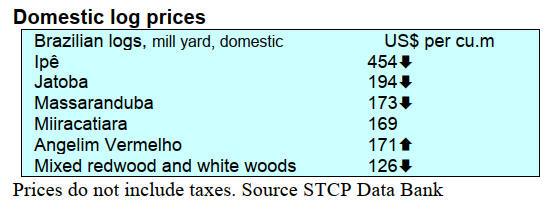
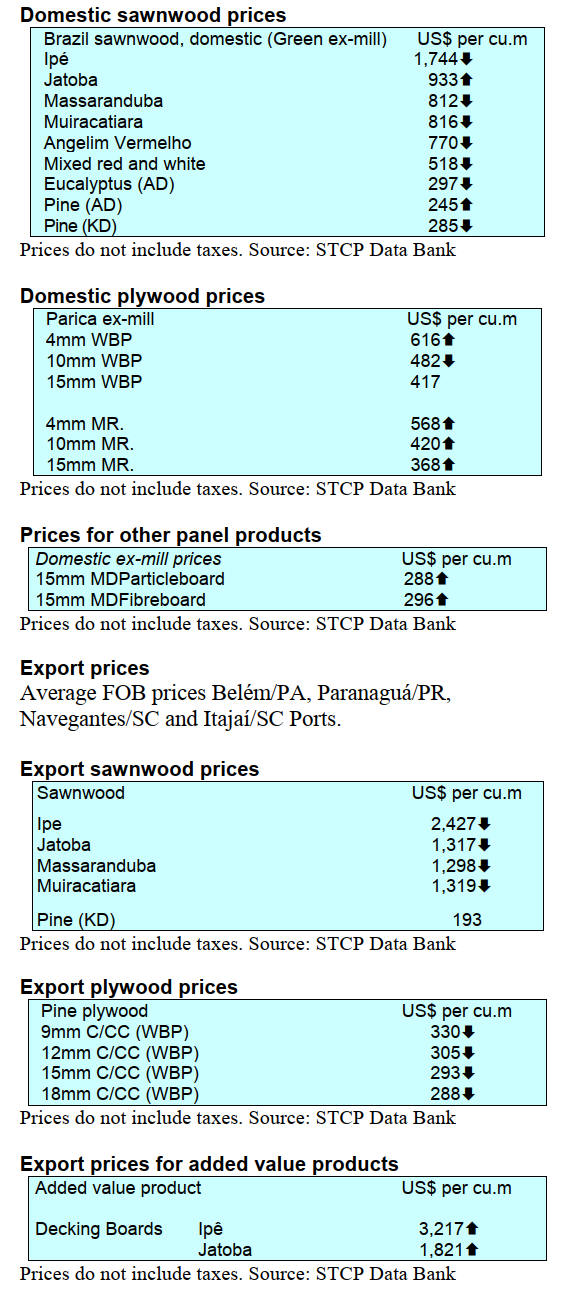
9. PERU
Exports declined in
first seven months of 2024
Peruvian shipments of wood and its derived products from
January to July 2024 totalled US$47.4 million, a drop of
23% compared to the same period in 2023 (US$61.9
million) according to the Extractive Industries and
Services Management of Exporters Association ADEX.
The decline was partly attributed to uncertainty in
international markets over purchasing 'shihuahuaco'
(Dipteryx spp.) due to its inclusion in Appendix II of the
Convention on International Trade in Endangered Species
of Wild Fauna and Flora (CITES).
In the first seven months of 2024, France was the largest
export destination for Peru’s wood sector, with a share of
16%, although sales to the country dropped 29% compared
to the same period in 2023.
The US is Peru’s second biggest timber export market. It
accounted for 15.6% of the country’s total timber exports
in the first seven months of 2024, with an increase in
purchases of around 50%. China is the country’s third
largest export destination, accounting for 14% of Peruvian
exports, although its purchases in the first seven months
were down 45%.
Plywood was one wood product export category that grew
substantially between January and July 2024, although
from a small base. According to ADEX, export value of
US$956,046 was 38 times higher than the same period last
year (US$24,420). Mexico was the largest export market,
accounting for US$691,662 (72%), followed by Ecuador
(US$221,231) and Colombia (US$ 42,508). Plywood
shipments were mainly out of Lima (US$734,395) and
Loreto (US$221,231).
Peruvian particleboard imports fall
In the first seven months of 2024, Peru’s particleboard
imports totalled US$78.9 million, representing a decrease
of 12.6% compared to US$90.3 million in the same period
in 2023. The main countries of origin were Ecuador,
declining 11.3% to US$38.6 million during the period, and
Spain down 14.0% to US$18.3 million. In contrast,
imports of this commodity from Brazil increased 16% to
US$11.8 million, while imports from Chile suffered a 34%
decline to US$8.9 million.
See: https://www.adexperu.org.pe/
OSINFOR strengthens forest supervision with new
technologies
Peru’s Forest and Wildlife Resources Supervision Agency
(OSINFOR) is turning to new technology to aid species
identification and strengthen forest monitoring. It has
been working on a pilot in Madre de Dios in conjunction
with the Forestry Wood Network, which comprises CITE
Madera Lima, CITE Forestal Maynas and CITE
Productivo Madre de Dios of the Technological Institute
of Production .
The joint effort had the logistical support of the United
States Forest Service and World Forest ID. It is using the
Xylotron field-portable wood species identification tool
and DART-TOFMS (Direct Analysis in Real Time-Time
of Flight Mass Spectrometry). These allow for the precise
identification of timber species, even as sawn timber. The
aim is to strengthen the traceability and, hence, ensure
legality of timber products in the first stage of the
production chain.
As part of the project, OSINFOR forest supervisors were
trained in the use of both tools. Together with
professionals from Red Forestal Madera, they collected
anatomical and dendrological samples of species of
interest and put them through the technologies’
identification process.
With the information obtained in the pilot collection of
anatomical and dendrological samples, OSINFOR will be
able to update its protocol for identifying forest species
during supervisions. This will allow for more effective and
timely detection of irregularities in the forest production
chain.
See: https://www.gob.pe/institucion/osinfor/noticias/1024022-el-
osinfor-fortalece-la-supervision-forestal-con-nuevas-tecnologias-
de-identificacion-de-especies-maderables
Peru to issue Deforestation-Free Certificate to facilitate
EUDR conformance
On 10 September 2024, Ministerial Resolution No. 0309-
2024-MIDAGRI was published, approving the electronic
document called "Deforestation Free Certificate" for
agricultural producers. This certificate will be issued after
verifying the non-existence of deforestation in the
evaluated area and ensuring compliance with Peru’s
forestry regulations.
Peru’s Deforestation Free Certificate has been created to
assist EU operators importing regulated products from
Peru to comply with the European Union Deforestation
Free Regulation.
Peru’s General Directorate of Statistics, Monitoring and
Evaluation of Policies of the Ministry of Agrarian
Development and Irrigation is responsible for verifying the
non-existence of deforestation. The directorate, with the
support of the National Forestry and Wildlife Service, is
also tasked with updating and systematizing the public
information contained in the certificate.
See: https://www.lexology.com/library/detail.aspx?g=6237ec73-
0cb0-4767-abe3-9a6164ac7c1b
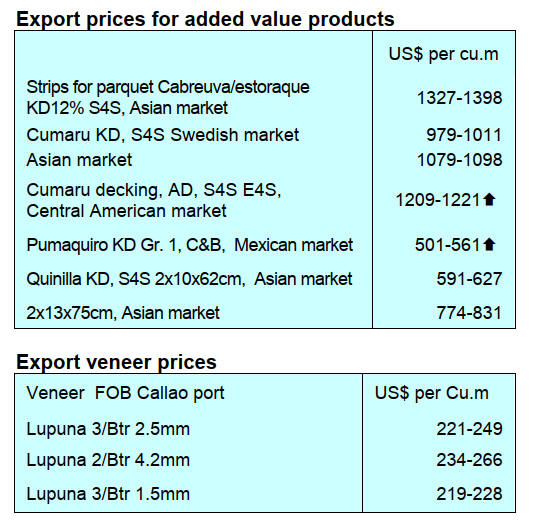
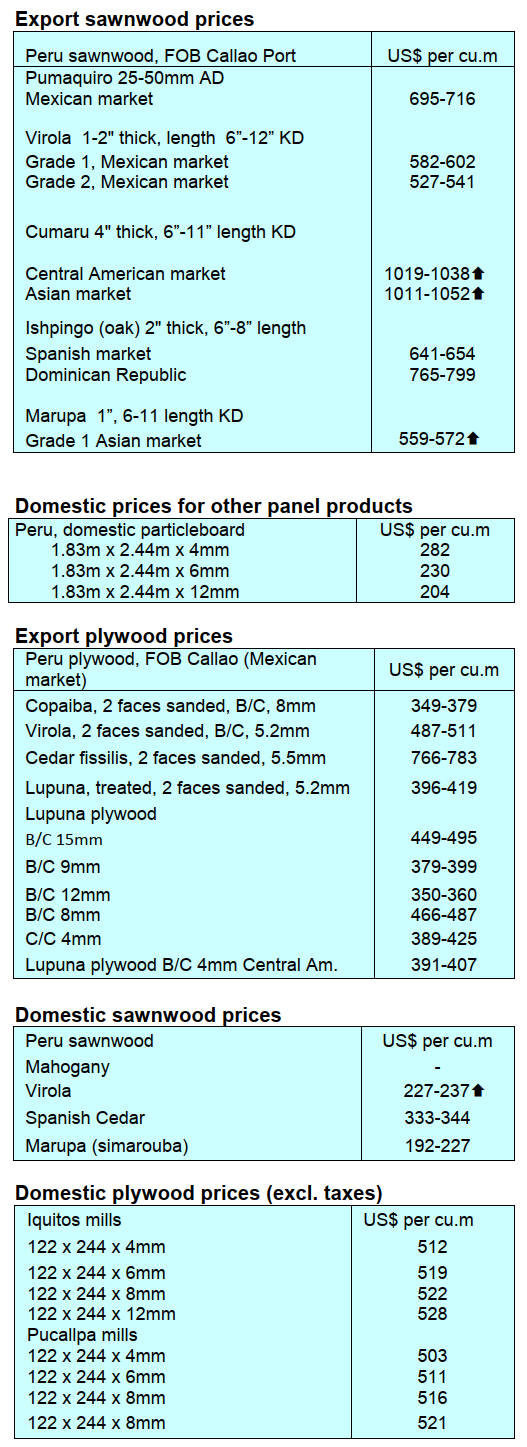
|